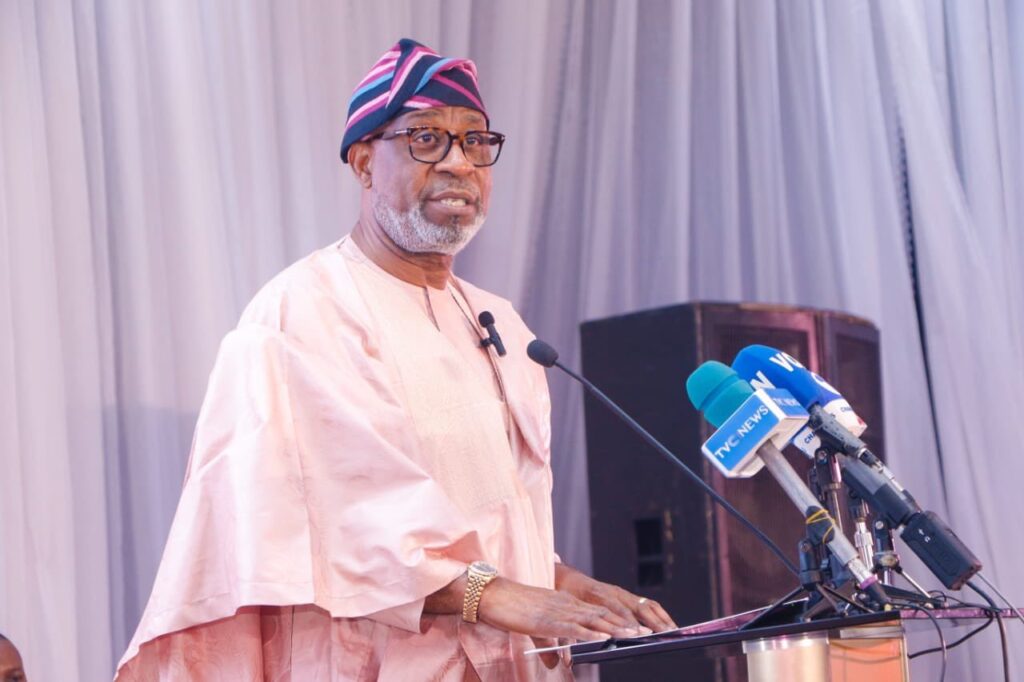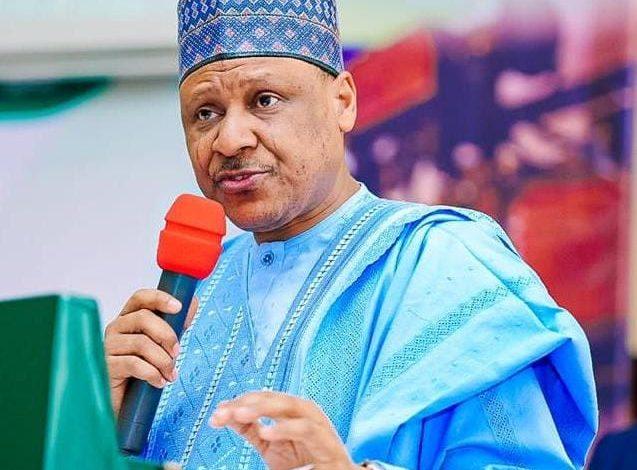Business
Cement price hike: FG threatens to open borders

By Seun Ibiyemi
The Federal Government says it might open the borders for cement importation, if manufacturers of the product fail to bring down the cost.
The Minister of Housing and Urban Development, Mr Ahmed Dangiwa issued the threat on Tuesday in Abuja at a meeting with Cement and Building Materials Manufacturers.
The meeting was summoned to address the astronomical increase in the cost of cement nationwide.
The minister expressed concerns that in the past couple of months, the country had witnessed a recurring alarming increase in the prices of cement and other building materials.
“Clearly, this is a crisis for housing delivery. An increase in essential building materials means an increase in the prices of houses.
“We are not the only country facing these challenges, many countries are facing the same type of challenges that we’re facing, some even worse than that.
“But, as patriotic citizens, we have to rally round the country when there is a crisis, to ensure that we do our best to save the situation,” he said.
The minister added: “Honestly speaking, we have to sit down and look at this critically and know how you should go back and think of it.
“The government stopped importation of cement in order to empower you to produce more and sell cheaper
“Otherwise the government can open the borders for mass importation of cement, the price will crash, but you will have no business to do.”
Dangiwa said the reasons given by cement manufacturers for the price increase – high cost of gas and manufacturing equipment – were not enough for such astronomical pricing.
He expressed his displeasure at the position of Cement Manufacturer Association of Nigeria (CEMAN) that the association “does not interfere with the pricing of cement.”
He said the association should not just fold its arms when things were going wrong.
“One person cannot be selling at N3500 per bag and another selling at N7000 per bag and you cannot call them to order.
“The association is expected to monitor price control, otherwise the association has no need to exist,” he said.
Earlier, Executive Secretary, CEMAN, Mr Salako James said the housing policy of the administration of President Bola Tinubu was laudable and every responsible Nigerian has to key into it.
He, however, identified some areas of concerns and appealed to the government to look into them in order to tackle the issue of cement pricing.
Salako identified the challenges of gas supply to heavy users like the cement industry and urged the government to create a window whereby gas will be bought with Naira instead of dollar.
He also complained about the distribution channel, stressing that there was a great difference between the price from the manufacturers and the market price.
He therefore called for government intervention to help stabilise the situation and bring sanity to the economy.
At the end of the meeting, the minister directed that a committee should be constituted to review the situation and come out with implementable resolutions that would benefit the common Nigerian.
Also three major cement producers, Dangote Plc, BUA Plc and Lafarge Plc were represented as well as other industry stakeholders.
Business
Nigeria to host 2025 NADPA conference


By Blessing Emmanuel
Nigeria has been unanimously selected to host the 10th edition of the Network of African Data Protection Authorities’ (NADPA-RADPA) Conference and Annual General Meeting.
This was announced after the country made a bid made by the country’s representative, the Nigeria Data Protection Commission (NDPC) at the just concluded 9th NADPA Annual General Meeting held in Nairobi, Kenya.
Led by the National Commissioner/CEO, Dr. Vincent Olatunji, NDPC emerged as the frontrunner among the 23 Data Protection Authorities across Africa.
Established in Ouagadougou in 2016, NADPA-RAPDP aims to foster collaboration among its members and amplify Africa’s voice in global partnerships. Nigeria’s active engagement since joining in 2022, including its role as coordinator for the Regulatory Harmonization working group, underscores its commitment to the network’s objectives.
In a statement by Head of Media Unit at NDPC, Mr. Itunu Dosekun, the recent Nairobi conference saw an impressive turnout, with over 1500 individuals and organisations, including multinational corporations like Google, Amazon Web Services, EY, and Microsoft, alongside development partners such as the European Union and the German Corporation.
The 2025 conference in Nigeria promises to be a pivotal platform for Data Protection Authorities to convene, collaborate, and exchange insights on emerging trends and challenges in data protection and privacy. Beyond fostering economic growth through Foreign Direct Investments and boosting the tourism sector, the event will elevate Nigeria’s reputation as a hub for innovation and academic excellence.
As Nigeria prepares to welcome esteemed delegates, the conference underscores the country’s dedication to advancing data protection principles and fostering international cooperation. With a multifaceted agenda, the event is poised to drive advancement within the data protection landscape and beyond, igniting growth and fostering collaboration.
Business
FG unveils portal to promote ease of investments in mining sector


The Federal Government on Tuesday unveiled a portal to facilitate the ease of investments into Nigeria’s mining sector.
The portal was unveiled by the Ministry of Solid Minerals Development in Abuja by the Minister of Solid Minerals Development, Dr Dele Alake.
Speaking, Alake said the Nigeria Mineral Resources Decision Support System (NMDSS) underscores the commitment of the federal government to expanding access of prospective investors to necessary information about Nigeria’s mineral deposits, policies guiding the mining sector and incentives for investment from anywhere in the world.
The Nigeria Mineral Resources Decision Support System (NMDSS) is a marketing strategy to enhance the ease of doing business in the solid minerals sector.
In his words: “Before, if you are a prospective foreign investor, you have to travel to Nigeria with your contingent to access required information. But with this launch today, anywhere you are in the world, with a click of a button, you can access all the information you require to make informed investment decisions about the mining sector.”
Speaking further, Dr. Alake emphasised that the support system will assist critical stakeholders in the mining sector and potential investors to garner requisite information, bringing them closer to the industry and providing answers to pertinent questions about mineral deposits and mining infrastructure amongst others.
Highlighting on-going efforts to sanitise the mining sector, the Minister revealed that the nefarious activities of illegal miners are being curbed by the recently unveiled mining marshals, whilst about 152 cooperatives have been formed by artisanal miners to legalise their operations, in line with his 7-point agenda.
In his remarks, the Minister of Interior, Hon. Tunji Olubunmi-Ojo lauded the transformative leadership that his solid minerals counterpart has brought to bear on the mining sector, noting that the launch of the NMDSS is a game-changer that will attract more foreign investments.
“Saudi Arabia today has non-oil industry contributing over 50 percent to her Gross Domestic Product (GDP). If Saudi Arabia can do it, Nigeria can do it, and the journey starts with the ministry of solid minerals. With a workaholic and visionary minister like Dr. Alake, working earnestly to attract the big players and also supporting local operators, the sky is the starting point. For us in the Ministry of Interior, we are there to support because a reformed mining industry is the pivot of the Renewed Hope agenda,” Hon. Olubunmi-Ojo said.
The Permanent Secretary, Ministry of Solid Minerals Development, Dr. Mary Ogbe, in her closing remarks, charged critical stakeholders in the mining sector and Nigerians at large to market the nation’s vast solid minerals potentials, stressing that reforms of the present administration are steadily repositioning the mining sector.
The Nigeria Mineral Resource Decision Support System (NMDSS) is a comprehensive software platform that serves as a one-stop shop for investors seeking credible and decisive information about Nigeria’s mineral resources, facilities and infrastructure.
The NMDSS portal can be accessed via: miningdecision.minesandsteel.gov.ng/nmrdss/.
Business
Media organisations to enjoy financing at single digit interest rates — Idris


Minister of Information and National Orientation, Mohammed Idris has disclosed that President Bola Ahmed Tinubu has directed the Federal Ministry of Industry, Trade and Investment, through the Bank of Industry (BOI), to extend its single-digit interest-rate financing to media organisations in the country.
The Minister of Information and National Orientation, Mohammed Idris stated this in Abuja on Wednesday when he received members of the Independent Broadcasting Association of Nigeria (IBAN) on a courtesy visit to his office.
According to the Minister, the gesture is in keeping with the administration’s resolve to create an enabling business environment for the media to operate in Nigeria.
“Let me say that the Federal Ministry of Information and National Orientation under my leadership, as part of our five pillars, will support all media platforms in this country, whether they are public or private.
“I can tell you that the President has directed the Federal Ministry of Industry, Trade and Investment to extend financing to media organisations at single-digit interest rates. I think you need to take advantage of that,” he said.
He therefore urged the IBAN members to develop bankable proposals to access the financing facility being offered by the Federal Government.
The Minister also frowned at instances of willful violation of advertising industry payment standards, condemning the habit by some practitioners of failing to remit advertising payments to media organizations within the approved 90 days.
Idris said, henceforth, the Advertising Regulatory Commission of Nigeria (ARCON), would be mandated to ensure that all advertising revenues due to media organisations are released to them promptly.
The Minister advised the private broadcasters to key into the Compressed Natural Gas (CNG) Initiative of the Federal Government to bring down the cost of their operations through cheaper access to energy.
Idris said with the commissioning of three gas projects by the President and other initiatives of his administration, Nigeria aims to attain sufficiency in gas processing for local consumption and export.
In response to the request from IBAN regarding the resumption of the Digital Switch Over (DSO) rollout, the Minister, who expressed deep concerns over the historically slow progress of the DSO initiative, stressed the need for a renewed and vigorous approach to ensure timely completion.
He conveyed that the President has instructed the ministry to expedite the DSO project by adopting successful models from other countries that have effectively transitioned from analog to digital broadcasting.
Earlier in his remarks, the Chairman of IBAN, Alhaji Ahmed Tijjani Ramalan complained of multifaceted challenges confronting the broadcasting industry in Nigeria, and called for urgent steps to revitalize the sector to stimulate innovation and empower indigenous media owners.
“The Nigerian broadcast industry, a cornerstone of the nation’s information and entertainment landscape, faces significant challenges hindering its ability to reach its full potential. There is the urgent need to take the initiative with a design to revitalise the industry, stimulate innovation, unlock the potential media economy and empower indigenous media entities,” he said.
He identified the high cost of energy, shortage of analog frequencies, delay in the payment of advertising revenues, and unrealistic audience measurement systems as some of the challenges bedeviling the broadcasting industry.
-
Finance4 months ago
Court orders Sen. Victor Umeh to repay N136m bank debt to AMCON
-



 Abuja Update3 months ago
Abuja Update3 months agoUNDP, FG partnership needed to achieve inclusion, equity- Minister
-
capital market2 years ago
Rt.briscoe, FBNH, Others halts negative performance of stock market
-
Abuja Update2 months ago
Banks drive stock market performance with N147bn gain
-



 Health1 month ago
Health1 month agoCapacity training will reduce migration of health workers- NPHCDA
-



 Business3 weeks ago
Business3 weeks agoTingo Group unveils Tingo Electric, Tingo Cola drink at Lagos launch
-
Submission Guidelines4 months ago
CALL FOR SUBMISSIONS: POETRY COLUMN-NND
-
News4 months ago
Oil thieves sponsoring malicious media campaign against Navy – Spokesman




